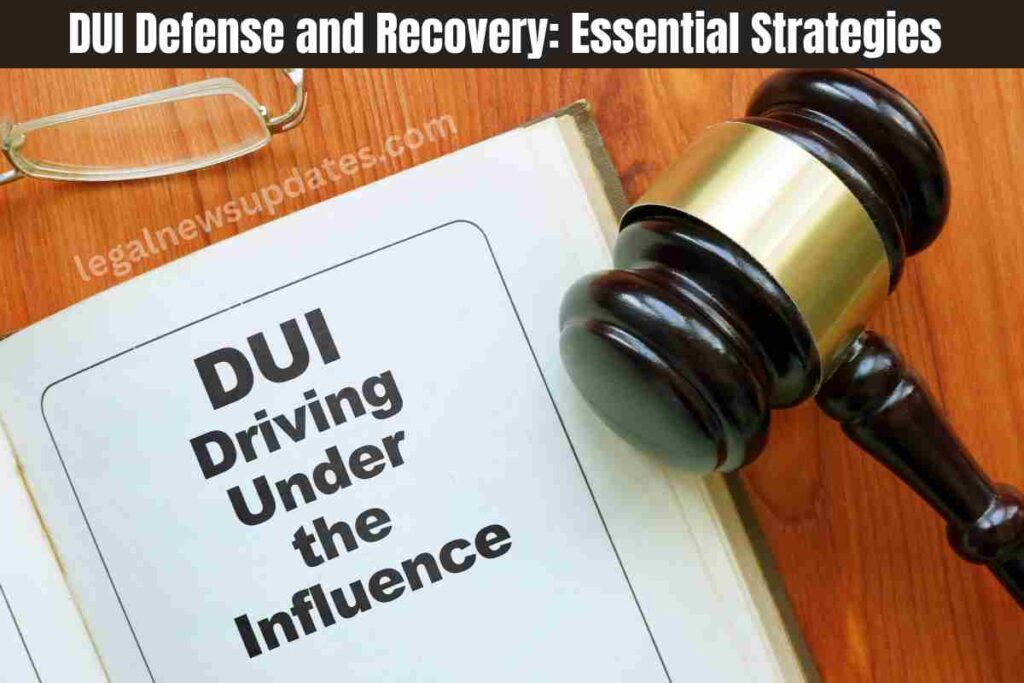Understanding and Preparing for DUI Charges
The Essentials of DUI Charges
DUI Defense and Recovery: Essential Strategies:-Driving Under the Influence (DUI), also known as DWI (Driving While Intoxicated) in some jurisdictions, stands as a significant legal offense that jeopardizes not only the safety of the driver but also the well-being of the public. This charge is levied against individuals found operating a vehicle under the impairment of alcohol or drugs, where impairment is typically quantified through a Blood Alcohol Concentration (BAC) of 0.08% or higher in most states. However, it’s crucial to acknowledge that DUI laws and penalties vary widely across different jurisdictions, encompassing not just fines and temporary license suspensions but potentially severe ramifications such as long-term jail sentences, especially in scenarios involving repeated offenses or incidents that result in injury or death.
Understanding the nuances of how alcohol and drugs influence one’s cognitive and motor functions is paramount. The rate at which alcohol affects an individual can depend on various factors, including body weight, gender, metabolism rate, and food intake. Recognizing these effects is the first step in evaluating one’s capacity to drive safely after consuming alcohol. The law doesn’t prohibit drinking per se, but it strictly penalizes impaired driving to safeguard public safety.
Preventative Measures
The foundation of DUI prevention lies in responsible planning and decision-making. Awareness campaigns and educational programs consistently emphasize the risks associated with impaired driving. A proactive approach involves assessing one’s plans involving alcohol consumption and ensuring alternative transportation options are available—be it designating a sober driver, utilizing public transit, or hailing a ride-sharing service. Personal breathalyzers have emerged as popular tools for self-assessment, though they should not be solely relied upon for deciding to drive, as their accuracy can vary. The emphasis on prevention is predicated on the understanding that the consequences of DUI extend beyond legal repercussions, affecting one’s personal and professional life profoundly.
Immediate Response to a DUI Stop: DUI Defense and Recovery: Essential Strategies
The moments following a stop by law enforcement for a suspected DUI are critical and can significantly influence the subsequent legal proceedings. It’s a situation fraught with stress and anxiety, where one’s actions and responses are closely scrutinized. Compliance with basic directives from law enforcement—such as providing identification and stepping out of the vehicle if requested—is advisable; however, individuals should also be mindful of their rights. For instance, the right to remain silent is a constitutional protection against self-incrimination. Politely declining to answer questions without legal representation present is within your rights and can be a prudent decision.
The decision to undergo field sobriety tests or preliminary breathalyzer tests presents a complex dilemma. In many states, refusal to submit to these tests can result in immediate arrest and license suspension under implied consent laws. However, such refusals also deprive prosecutors of concrete evidence of impairment at the time of the stop. It’s a strategic decision that an understanding of the specific laws in your jurisdiction.
Navigating the Legal System
Upon arrest for a DUI, the importance of securing experienced legal counsel cannot be overstated. The legal landscape surrounding DUI offenses is intricate, with nuances that can significantly affect the outcome of a case. A seasoned DUI defense attorney can offer invaluable guidance from the initial arraignment to trial or settlement negotiations. Legal strategies in DUI cases may involve:
Challenging the legality of the traffic stop itself.
She is contesting the accuracy and administration of BAC testing.
Arguing against the reliability of officer observations and field sobriety tests.
Defense attorneys may also explore less conventional strategies, such as arguing a necessity defense—claiming that the defendant was compelled to drive under duress or in an emergency. Each case is unique, and a tailored defense strategy that considers all available evidence and legal precedents is essential for the best possible outcome.
Exploring Defense Strategies
Effective defense strategies in DUI cases are as varied as the circumstances surrounding each incident. A critical analysis of the procedure followed during the traffic stop and subsequent arrest can reveal constitutional violations or procedural errors that could lead to the suppression of evidence or even dismissal of charges. For instance, challenging the calibration and maintenance records of breathalyzer devices can undermine the trustworthiness of BAC results.
For repeat DUI offenses, defense strategies may focus on plea deals that prioritize rehabilitation to address underlying issues. Meanwhile, for underage DUI cases, strategies often highlight the need for education and rehabilitation over strict penalties, considering the significant impact on a young person’s future.
The Aftermath of a DUI Charge
The journey following a DUI conviction is fraught with challenges and obstacles. Particularly in navigating the repercussions that extend beyond the courtroom. Adherence to court-ordered penalties, such as participation in DUI education programs, community service, or the installation of ignition interlock devices, is a legal obligation and a step toward rehabilitation and restoring driving privileges.
The stigma of a DUI conviction can permeate various aspects of one’s life. Like affecting employment opportunities, professional licenses, and personal relationships. The financial implications, including increased insurance premiums and legal costs, can be substantial. Reintegrating into society and regaining a sense of normalcy requires a proactive approach to compliance, education, and personal growth.
Conclusion: DUI Defense and Recovery: Essential Strategies
Facing DUI charges is undeniably daunting, with potential consequences that can alter the course of one’s life. Yet, individuals can navigate these challenges through preventative awareness, informed immediate responses, strategic legal defense, and a commitment to rehabilitation and compliance. The overarching message is clear: the best defense against DUI charges is prevention. However, should one face such charges. Understanding the legal system and seeking qualified legal representation is paramount to safeguarding one’s rights and future.
